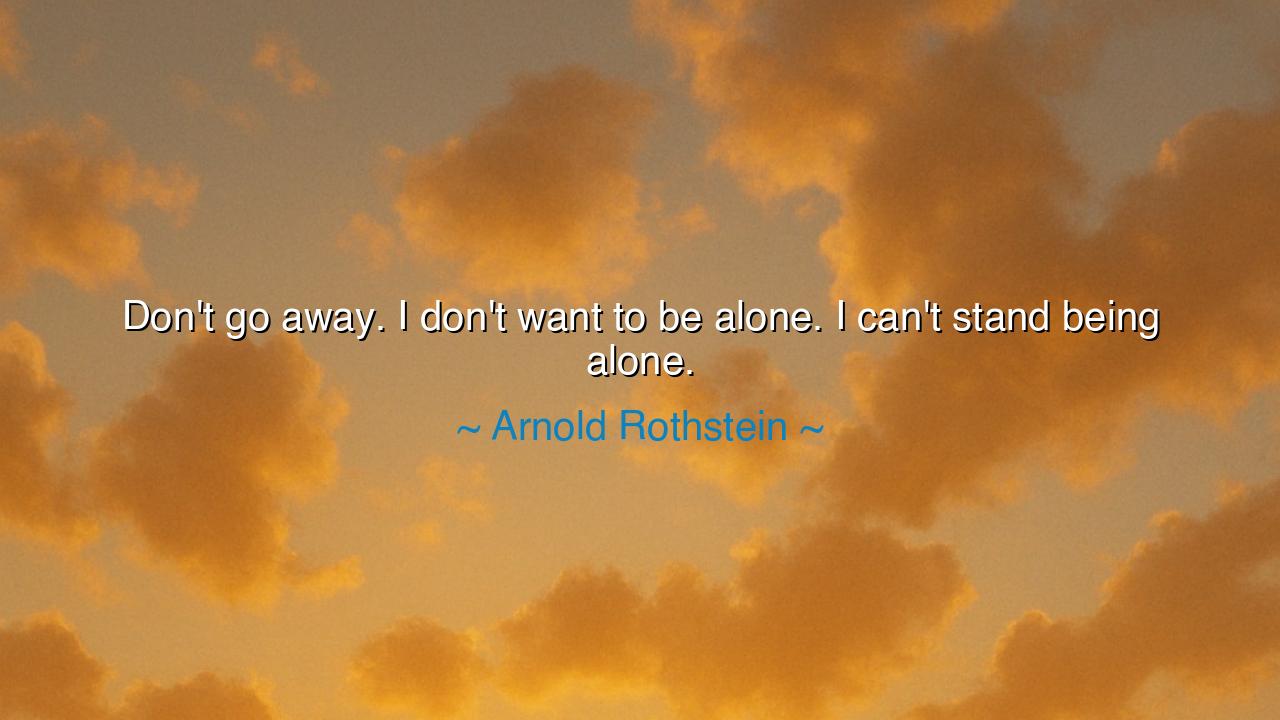
Don't go away. I don't want to be alone. I can't stand being






Arnold Rothstein's words, "Don't go away. I don't want to be alone. I can't stand being alone," speak to the deep human fear of isolation—the overwhelming feeling of being disconnected from others. In these words, Rothstein, a figure known for his involvement in organized crime, expresses a vulnerability that many of us share: the inability to face solitude. Though he may have commanded power and respect in his world, even he, at a fundamental level, was not immune to the loneliness that can arise when we are disconnected from others. This desire for companionship, for presence, is a fundamental aspect of the human condition, revealing how deeply our identities and our emotional well-being are shaped by our relationships with others.
The ancients often spoke of solitude in a way that acknowledged both its pain and its potential for growth. Aristotle, in his explorations of virtue and happiness, suggested that man is by nature a social animal, and that community is necessary for a full and flourishing life. Yet, he also understood that solitude, when chosen for contemplation or reflection, could be an avenue for self-discovery and personal growth. The Stoics, such as Seneca, taught that solitude could help an individual develop self-mastery and virtue, as it allowed one to escape the distractions of society and come into alignment with the inner self. However, these teachings often stressed that this solitude was not to be feared but embraced. The fear of isolation expressed by Rothstein highlights the darker side of solitude, where it can feel like a suffocating emptiness rather than an opportunity for reflection.
Consider the life of the philosopher Diogenes, who, in his pursuit of wisdom, famously chose a life of extreme solitude, rejecting the norms of society. Yet, while Diogenes sought physical isolation to cultivate a deeper understanding of self-reliance, he was also deeply aware of the human need for connection. His choice to live alone was not one born of fear but of a desire to live authentically and without external distractions. Diogenes’ solitude allowed him to express his unique philosophy, but even in his extreme actions, there was an acknowledgment of the human need for interaction. Rothstein’s words reflect the opposite—his plea underscores the painful necessity of others for emotional well-being and balance, a sentiment that runs counter to the Stoic ideal of peaceful isolation.
The story of Vincent van Gogh, one of the most brilliant but tragically isolated artists in history, illuminates the depths of loneliness that Rothstein speaks of. Van Gogh’s genius was undeniable, yet his mental health struggles, compounded by a life of isolation, led him to suffer greatly. Despite his relationships with his brother Theo and a few friends, Van Gogh often felt like an outsider in the world. His plea for companionship, whether spoken or unspoken, is reflected in his letters, where he expressed his longing for connection and understanding. The loneliness he experienced did not diminish his talent but profoundly affected his emotional well-being. Van Gogh’s story shows how even the most gifted can feel the painful weight of solitude, and how the absence of meaningful connection can shape one’s inner world.
Yet, there is also wisdom in learning to face solitude. The teachings of Ralph Waldo Emerson, the great transcendentalist, emphasize the importance of self-reliance and solitude as a means of connecting with one's true self. Emerson argued that it is in moments of solitude that we can hear our deepest truths, free from the noise of society and external expectations. His words encourage us to see solitude not as something to fear, but as an opportunity to cultivate inner peace, strength, and clarity. Rothstein's desire for company, while deeply human, is a reminder of the importance of not becoming overly reliant on the presence of others for our emotional well-being.
The lesson from Rothstein’s quote is both universal and personal. Loneliness is a human experience that touches us all, but it is how we respond to it that defines us. Solitude can be a test of one’s inner strength, and a moment of growth or despair. The key is to learn not to avoid solitude but to embrace it as an opportunity for self-reflection, renewal, and a deeper understanding of self. Connection with others is vital, but the ability to be whole in one's own company is equally important.
Therefore, I encourage you, dear reader, to reflect on your own relationship with solitude. When faced with moments of loneliness, do not view them solely as a burden, but as an invitation to discover and nurture your own inner resources. Solitude can be an opportunity to connect with the self on a deeper level, to confront your fears, and to recharge emotionally. Like Rothstein, we may long for connection, but true fulfillment comes from learning to stand strong in our own company, knowing that in solitude, we can find the strength to face the world and emerge more whole.






AAdministratorAdministrator
Welcome, honored guests. Please leave a comment, we will respond soon